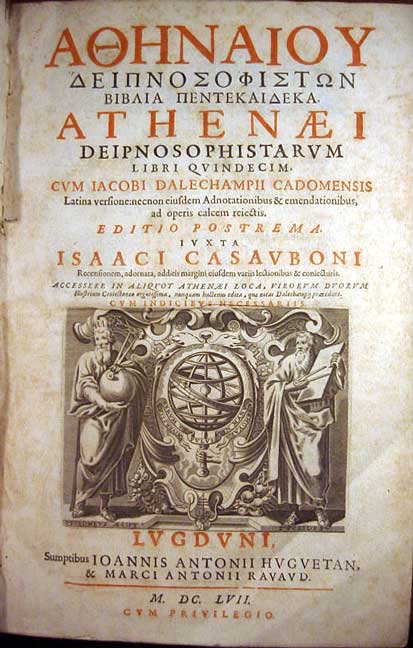
Aπάθεια (callousness or insensibility) was sometimes used to mean avoidance of pleasure and pain. "Apathy ( ἀπάθεια) they (Cynics) regard as the end and aim" (Julian 6, 192). Teles in his discussion, περί ἀπάθειας, urges that we should not grieve at the death of friends or children; he says, "A man is happy who is free from suffering and trouble" (Stobaeus, Flor. 4, 108, 83). Stobaeus also has, "Diogenes said, ‘We say it is true happiness when the mind and the soul are peaceful and cheerful'" (Flor. 4, 103, 21). The 34th Letter of Crates, in describing the nonchalant demeanor of Diogenes when offered for sale by pirates, adds, "The purchasers who were standing about listened and admired him on account of his apathy." Diogenes is represented as writing, "I speak plainly as an interpreter of apathy, opposing the life of folly" (21st Letter).
Athenaeus says, addressing Cynics: "According to Clearchus the Solensian, you do not adopt a manly system of life, but you do really aim at a system which might become a dog; but although this animal has four excellent qualities, you select none but the worst of his qualities for your imitation. For the dog is a wonderful animal as to his power of smelling and distinguishing what belongs to his own family and what does not; and the way in which he associates with man, and the manner in which he watches over and protects the houses of all those who are kind to him, is extraordinary. But you, who imitate the dogs, do neither of these things. For you do not associate with men, nor do you distinguish between those with whom you are acquainted; and being very deficient in sensibility, you live in an indolent and indifferent manner. But the dog is also a snarling and greedy animal, and is also hard in his way of living and naked; these habits of his you practice, being abusive and gluttonous, and besides all this, living without a home or hearth" (Deip. 13, 33). The dog which the Cynic imitated was not the watch dog or the trained hunting dog but the ownerless vagrant.
Image: 1657 edition of the Deipnosophists by Athanaeus
Public Domain via Wikimedia Commons
Other Posts in the Diogenes of Sinope series
The Cynics Referred to the Habits of Animals
Slump towards Animalism
Attitude of the Cynics Towards Pleasure
Happiness Did Not Exclude Pleasure
Diogenes as Hedonist
Short Road to Happiness or Short Cut to Virtue?
Despising Pleasure is Pleasurable
What is Virtue for a Cynic: Cats for Thievery
What is Virtue for a Cynic: Promiscuous Sexual Intercourse
The Cynic Sought Freedom
Labor Did Not Enter into the Cynic Scheme of Life
The Easy Life of the Cynic
The Cynic was Fond of Comparing Himself with Kings and Emperors
The Object of the Cynic was Happiness
I Am a Citizen of the World
Freedom of Speech is the Most Beautiful Thing in the World
An Excess of Infamy
A Man Should Live Contented with Present Things
This post has received a 0.24 % upvote from @drotto thanks to: @banjo.
Downvoting a post can decrease pending rewards and make it less visible. Common reasons:
Submit
Congratulations! This post has been upvoted from the communal account, @minnowsupport, by roomerkind from the Minnow Support Project. It's a witness project run by aggroed, ausbitbank, teamsteem, theprophet0, someguy123, neoxian, followbtcnews/crimsonclad, and netuoso. The goal is to help Steemit grow by supporting Minnows and creating a social network. Please find us in the Peace, Abundance, and Liberty Network (PALnet) Discord Channel. It's a completely public and open space to all members of the Steemit community who voluntarily choose to be there.
Downvoting a post can decrease pending rewards and make it less visible. Common reasons:
Submit
@driva has voted on behalf of @minnowpond. If you would like to recieve upvotes from minnowponds team on all your posts, simply FOLLOW @minnowpond.
Downvoting a post can decrease pending rewards and make it less visible. Common reasons:
Submit